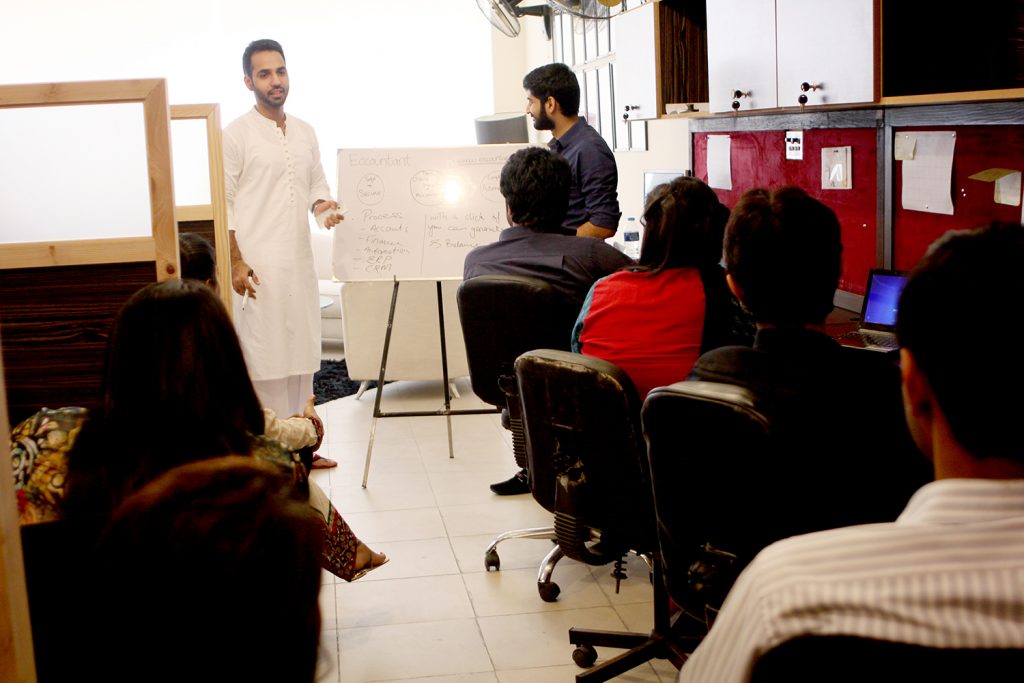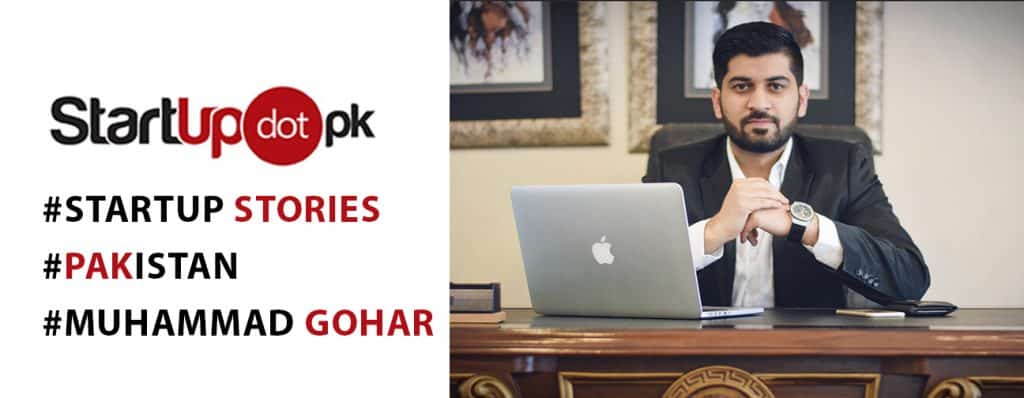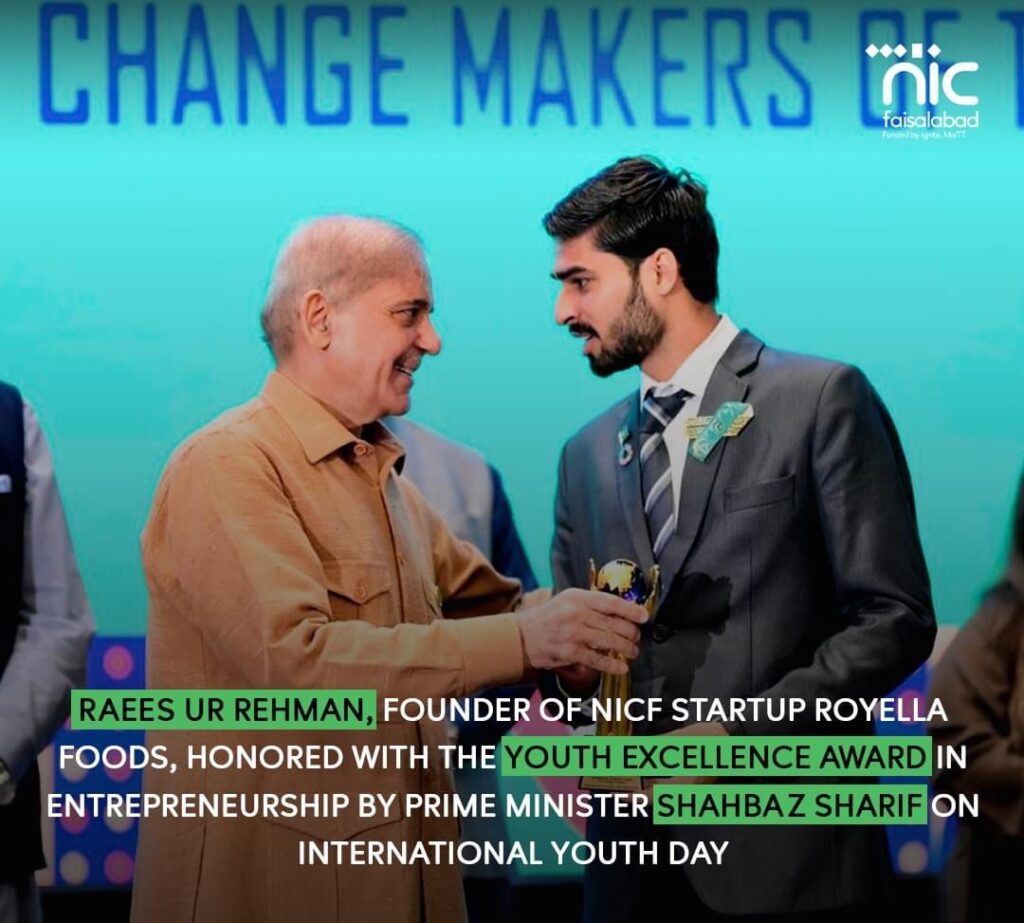An Entrepreneur is someone who jumps off a cliff and builds a plane on his way down- Reid Hoffman
Muhammad Gohar is a 24 year old enthusiastic, self-made entrepreneur. He is a graduate from LSE in Marketing/media studies. At such a young age he is the founder and director of multiple companies. His journey is driven by passion and eagerness to learn. Gohar’s entrepreneurial journey started back in his undergrad life by founding a clothing company called Jigsaw TeesGohar’s first startup, Jigsaw Tees, failed miserably. He did not give up and learned from his mistakes. A few years later after he founded Ivoke which is (now) one of the leading digital agencies in Pakistan.Unfortunately this startup did not go as planned. Yet this did not stop him, his desire for success was greater than his fear for failure. He co-founded Ivoke with his friend Zain Ashraf. Ivoke is one of the leading interactive digital agencies in Pakistan. Gohar’s latest venture is called Eccountant– a cloud based software that provides accounting solutions to SMEs (Small and Medium Enterprises). Eccountant gained massive recognition within a few weeks of its launch. Gohar also serves as the Vice President of a non-profit organization called Seed Out, where they are trying to alleviate poverty by raising micro entrepreneurs through crowdfunding and interest free micro finance.
Gohar has also co-founded Araam.pk with Sania and Irsa– which connects people to service professionals within 24 hours. Apart from these ventures, Being involved in so many businesses, Gohar has valuable insights of the market and the industry. He took out a few minutes this week on Tuesday to talk to Startup.pk.
Q: Hi Gohar. You are a graduate in Marketing and Media studies but you run companies that particularly provide tech solutions to different startups. How do you relate to this, did you have any previous experiences or expertise?
A: That’s the most frequently asked question from me. I am a big advocate of self-learning. Since a very early stage of my life I had been exploring things and learning new skills. The formal education gives you a degree, improves you as an individual but to utilize your productivity at its best you can’t just rely on it. I founded a non-profit organization called Heal Pakistan (a youth driven peace initiative) about 3 years ago. When I wanted to build a website for it, I went to different software houses and found that they were quite expensive. Being an NGO, we couldn’t effort such high charges. That moment stimulated me; I started to learn website development, design, graphics etc. That’s how my journey in the tech industry started. During the finding and learning process I met a lot of people. People with similar vision, people with changed mindsets. This passive learning I think is the best way that makes you learn things.
At Ivoke we have highly experienced tech professionals. Yet as a leader and founder, I believe that I should be aware of the basics of all the tasks my team is performing whether it is sales, marketing, development or accounting etc.
Q: Since you are such a strong advocate of self-learning, where do you find this inspiration from and what medium do you use for self-learning?
A: I follow thought provoking leaders from around the world. To name a few Caleb Maddix, Elon Musk, Neil Patel, Grant Cardone are my inspiration. A person should never stop learning but it is important to make sure you learn from the best of the resources available.
Q: Starting from your first venture, Jigsaw tees, that didn’t work out so well to your successful venture of Ivoke which is geared with Fortune 500 companies. Can you sum up these years?
A: Jigsaw Tees was a clothing company that I started with my friends. Our first product was a big hit. We got so overwhelmed that it lead us to certain miscalculations and mismanagement. Our second product failed miserably and we had to shut down the company. It gave me some very important lessons. After Jigsaw Tees, I took a break and focused on my studies. In the mean time, I met an old friend, Zain Ashraf, who had come from Miami to Pakistan. Zain and I started working on Seed Out- World’s first Interest Crowd funding platform.
At the time, Seed Out and Heal Pakistan were going side by side. In order to solve the technical issues of both the companies, we were in dire need of a digital solution; a software company that could actually understand our concerns and provide a personalized solution. Necessity is the mother of invention. We founded such a digital solution ourselves that we call “Ivoke”.
Q: What kind of issues?
A: We realized that people or companies in our market were afraid of adopting technology. They had a fear of trying it. This resulted in the outdated UIs and manual processes. When we compared it to the international scene, it was totally opposite. The international companies were many years ahead of us in technology; they were utilizing its full potential giving a whole new level to everything.
Q: What do you think were the reasons of this attitude of the Pakistani companies? How has Ivoke solved these issues?
A: Two reasons are the cause of this: firstly when a company or person in Pakistan searches for a digital service what he finds is low level products sold in high prices. Secondly, some bad past experiences leaves the companies being fearful of utilizing tech. As a result, we lack behind despite having all the potential to grow.
At Ivoke, we create value for the amount of money our customers pay to us. We focus on customer support services which I think essentially every company should do. Our team takes time to understand the requirements and individual demands of each project. Together with our creativity and technology skills we strive to provide the best service.
Q: I have read that the origin of Eccountant is also based on some problem you faced at Ivoke?
A: Yes, I was working to create an Invoice for a project. I wanted it to be the best invoice that would create an impression for Ivoke. After working for 5 hours, we suffered a backup failure and the data was lost forever. I sat down with my team and we talked about how to deal with invoices. The Software for invoicing such as Quickbook either were too generic or were not offering the features we were looking for. So, after some work we developed a simple version of accounting software that we would like to use for Ivoke. It was just an amateur product; we made it available for free to other people. But amazingly we got a very huge response.800 people signed up to use it within first 6 weeks. Out of these 800, 200 were ready to pay us for the product.

Gohar’s team discussing about Eccountant
Then we decided to take it seriously; We took Eccountant to Dublin summit and discussed the idea with different investors. In countries like Pakistan, India, Bangladesh, UAE no such cloud accounting software exists so we realized that we have a huge market for Eccountant. After some refining and talking with the customers about their expectations and needs we launched Eccountant formally last month and got 15+ paying customers that bought one-year subscription within 3 weeks.
Q: What lies in future for Ivoke and Eccountant? Would you continue identifying problems and proposing solutions in the form of startups?
A: Well no. I don’t think so. Now, I want to focus on these companies and make them grow. That’s actually not a very good move from my side to indulge myself in different businesses. I would not advise others to do so. In the starting years, they should solely focus on single ideas.
Both Ivoke, Eccountant and Araam are very dear to me; I see them growing further in the future. For Eccountant we have partnered with chartered accountants and are also working to introduce a module of Eccountant in different institutions. These are some of the short term goals. In the long run, I see Eccountant becoming a national brand.
Q: That’s great! Good luck. As you are into a lot of things, we really want to know how you manage your day and the work.
A: When I started as an entrepreneur, I wanted to do everything on my own. But as the workload increased, I realized that was not humanely possible to do. So, Today, I don’t manage the things on a micro-level but I manage everything as a whole. My day starts at 8am, by 10 I am at my workplace. I prioritize the tasks on the basis of their importance. I seek leisure with friends and family like any other person. On a side note I am struggling to become an early riser and start my day at 4am.
Entrepreneurship brings you a lot of responsibilities. You have to learn to manage them, compromise certain things and prioritize others.



